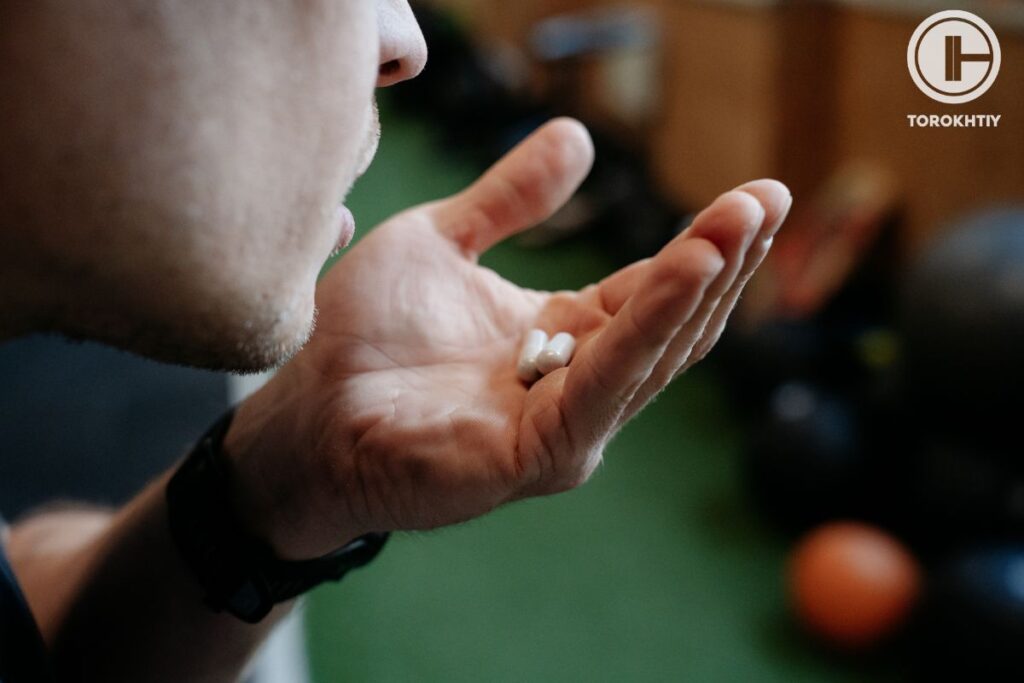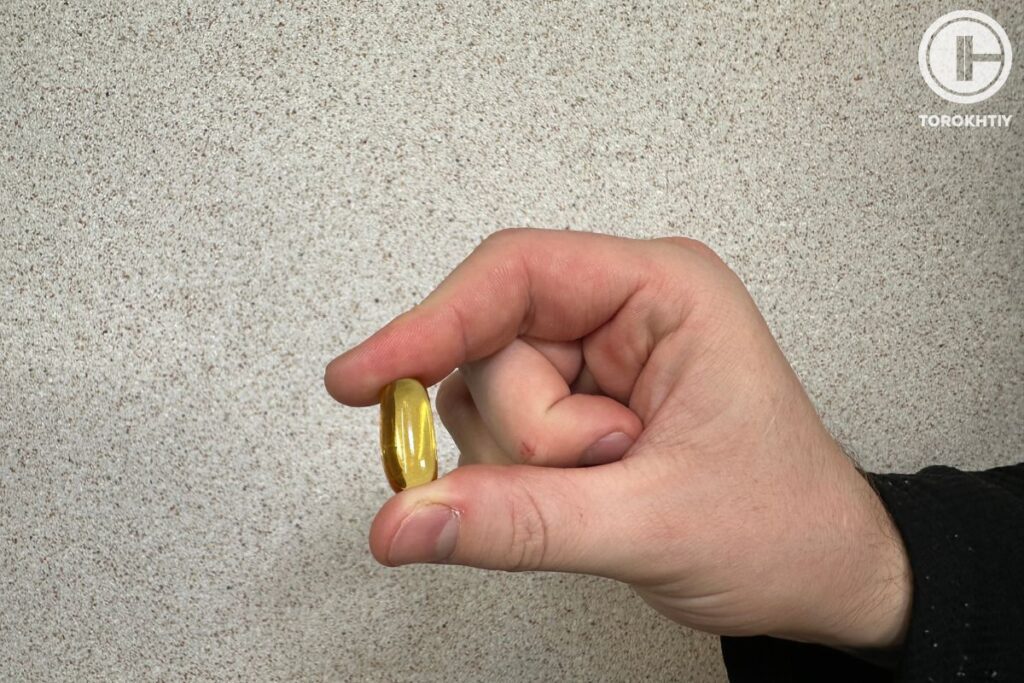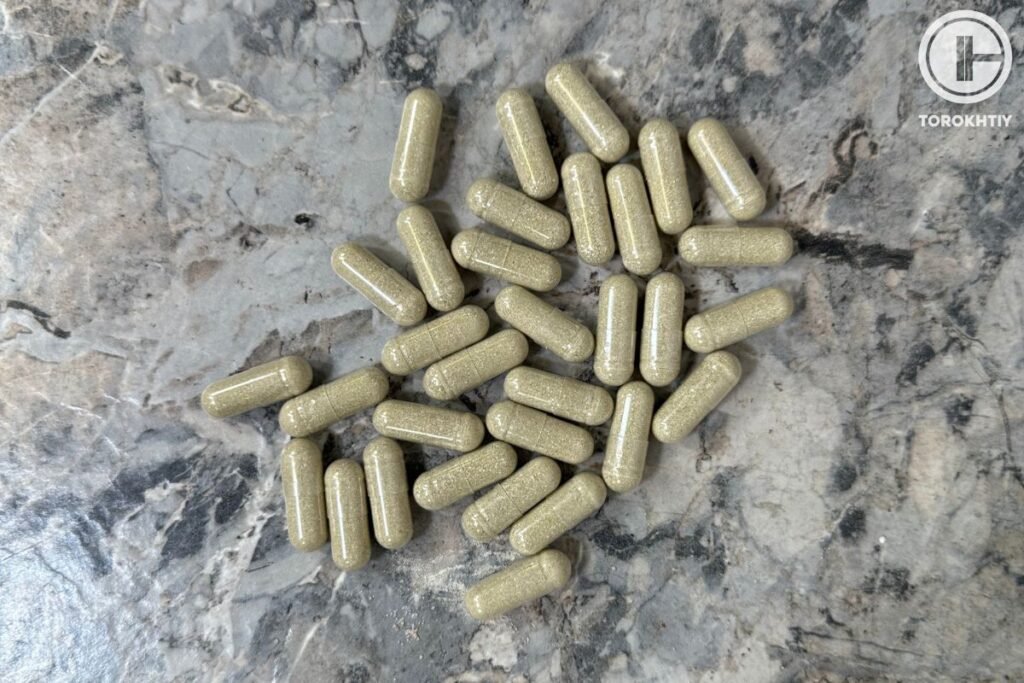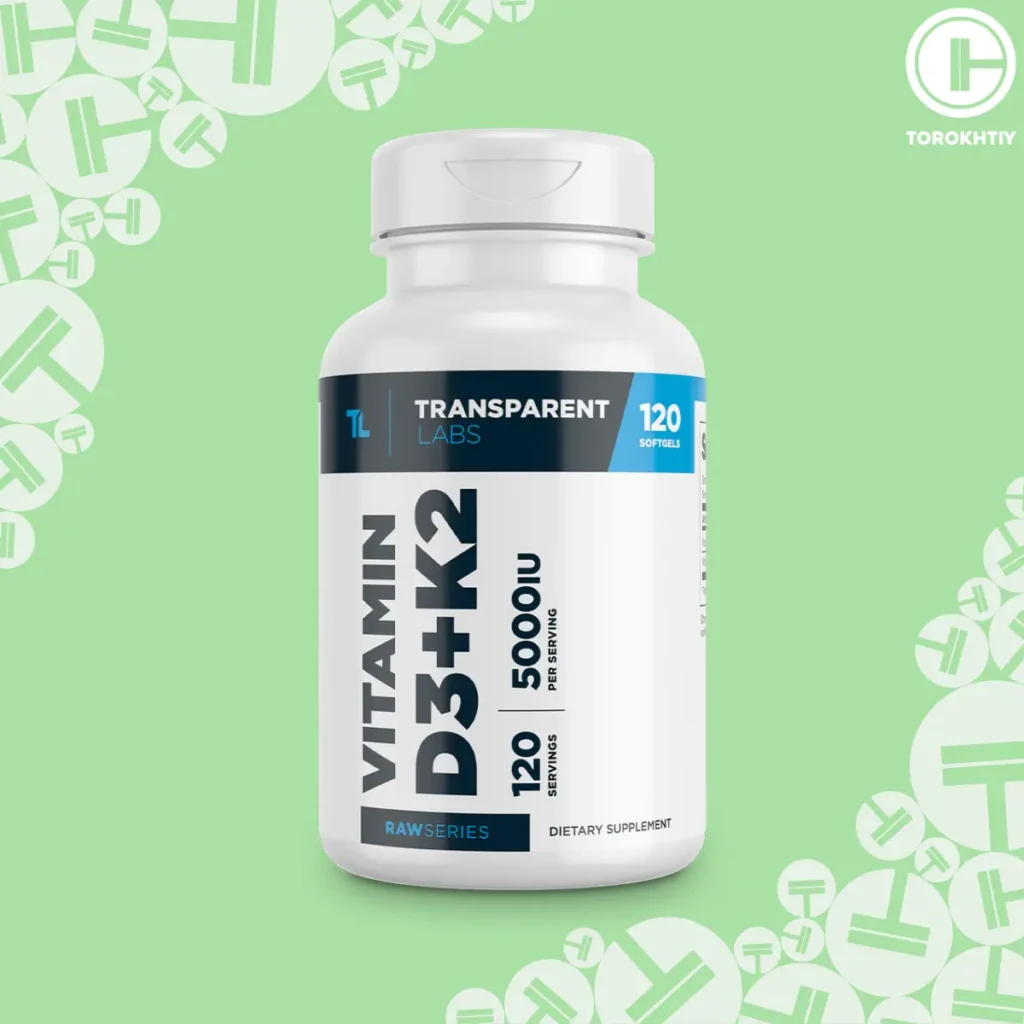Vitamin D3 and K2 Combination Benefits
Author:
Unlock your full potential by engaging with our experts and community! Have questions about your fitness journey or looking for expert advice on weightlifting techniques? Don’t hesitate — leave a comment below and Jacek Szymanowski will provide a personalized answer and insights to help you reach your goals.
Torokhtiy is reader-supported. Some links are affiliate links, and we may earn a commission at no extra cost to you. See our disclosure page for details.
Hey Warriors! I’m Jacek. If you’ve ever wondered if/why you may need vitamin D and K supplement, questioned the effectiveness of one you are taking or simply looking to include it in your nutrition plan, you’re in the right place my friend.
Vitamins D and K are powerful on their own, but when you put them together, wow! They have a host of really impressive health benefits and we’ll go into detail on them. Improved bone density, reduced risk of osteoporosis, better cardiovascular health… Those are just some of them.
By the end of the article, you’ll understand exactly what these two superstars are good for and whether you should be taking them or not. We’ll also talk about the dosage and what makes this combination so popular.
Let’s start!

Roles of Vitamins D3 and K2 in the Human Body
Let me try to separate good information from bro-science, about vitamin D3 and K2 in terms of nutrition for athletes (and not only for athletes, but overall tbh). Fortunately the evidence is strong about the roles and benefits of Vitamin D3 and K2 for health and well-being.
Vitamin D deficiency is a global health problem probably caused mainly by insufficient sunlight exposure. Can you imagine that it’s estimated that 1 billion people have vitamin D deficiency or insufficiency, particularly prevalent among elderly people.
A systematic review of vitamin D status in populations worldwide showed that 88% of participants had low to suboptimal vitamin D levels. This is where supplementation should be considered.
Vitamin D3 is often associated with bone health and ability to affect your immunity. That is what you probably already know. What you may not know is that it also plays a role in regulation of gene expression and muscular performance. So vitamin D influence is much more important than “just” calcium metabolism.
I wouldn’t be me if I would not include info about vitamin D and its connection to testosterone synthesis 🙂. It can influence its production in a few ways but let’s talk about the interesting and less obvious ones. Leydig cells in testes that are responsible for testosterone production have receptors for vitamin D – VDRs.
Because Vitamin D can bind to these receptors I think we can make a reasonable assumption that vitamin D can potentially influence testosterone production. The next one is interesting as well. As we know testosterone is synthesized from cholesterol – not directly tho, it requires a series of reactions but eventually leads to testosterone synthesis.
It looks like vitamin D – particularly its active form vitamin D3 – plays a role in a regulatory process by modulating the expression of genes responsible for production of human steroid hormones, in this case – sex hormones like testosterone.
Vitamin K2, just like D is a fat-soluble vitamin. It plays a role in blood coagulation and supplementation may possibly (may and possibly are the keywords here) contribute to cardiovascular health. It’s quite often overlooked but it plays a critical role in calcium regulation.
K2 ensures proper calcium allocation – keeping the arteries clear of calcification and making sure the bones get the minerals they need.

Why Is the Combination of Vitamins D3 + K2 So Popular?
Not sure what are vitamin d3 and k2 combination benefits? That interesting connection between D3 and K2 is where the real magic happens – D3 facilitates calcium absorption, and later vitamin K2 ensures its deposition in skeletal tissue rather than arteries.
Let’s simplify a bit 🙂 let’s say vitamin D helps you with calcium absorption from your digestive tract, but after absorption that calcium needs to go where it should, and this is where vitamin K2 is entering the chat, it makes sure that calcium goes to your bones and not get located in your vascular tissue.
This mutual effect regulates blood calcium levels, can possibly enhance bone health, in some cases can lower injury risks, and fine-tunes muscle function.
For athletes serious about optimizing performance, understanding the evidence-backed interplay between Vitamin D3 and K2 can be an advantage. It’s precision science that can be sometimes overlooked.
1. Possible Beneficial Effects for Bone Density
In terms of bone health, supplementation of Vitamin D3 and K2 seems like a robust approach with some possible benefits. As I said before, Vitamin D3’s role in calcium absorption kind of sets the stage for optimal bone mineralization, and K2 makes sure that this essential mineral (Calcium) finds its way to skeletal tissues.
Vitamin K activates proteins like Osteocalcin and MGP. Osteocalcin assists in bone mineralization, while MGP protects blood vessels from excessive calcification. K2’s involvement in activating osteocalcin, an important protein for bone health, contributes to the maintenance of bone density.
Meta-analysis of 8 randomized controlled trials shows that combining vitamin D with K can increase total bone mineral density. This action not only potentially improves bone density but also serves as a proactive measure against fractures, particularly relevant for those at risk of osteoporosis. Supplementing the right doses vit D3 and K2 looks like a good strategy.
Just be aware that not all studies observed similar results and there are also some that after 3 years show no differences in bone health, in the group (older man and women) that had vit K supplement added to a multivitamin dose consisting of vit D and calcium, compared to one that did not get extra vit K.
So as always context matters. Supplements are meant to help (as the name implies) with deficiencies and adding more than is required is not always better and in some cases can have strong adverse effects.

2. Might Benefit Cardiovascular Health
That synergistic interplay between D3 and K2 prevents arterial calcification, offering potential cardiovascular benefits. Keep in mind that “potential” is the keyword here. There is a huge difference in the studied mechanism and actual result when we include that mechanism in the body orchestra of metabolic pathways.
Just because something is happening in animal studies and petri dishes (in vitro) does not automatically mean the result will be the same, or even similar in humans. Another thing is that just because vitamin K plays a role in calcium allocation, it also does not mean it can reverse “damage” that is already done. All of that requires more studies to be done to fully understand that complex relationship.
That being said when yo?u’re deficient – you’re deficient and supplementation most likely will help. So let’s highlight that important information again – context matters and adequate levels of vitamins and minerals in your body are crucial for your health and well-being, and you already know some of the roles of vitamin D and K in the human body.
For that reason (and specifically in terms of cardiovascular health), because as you probably already know 🙂 I’m a context guy, I won’t give you recommendations for d3/k2 supplement as I believe it should be tailored to individual needs and health status.
How to Choose the Best Vitamin D3 and K2 Supplements?
If you are wondering how to choose the best d3 k2 supplement when you need them, let’s look at a few factors that may play quite an important role and I will try to explain why it matters.
Hey, while it is not always strictly necessary to obtain approval from a healthcare provider before including vitamin D3 and K2 supplements in your diet, especially when you can basically buy them everywhere… I strongly recommend it!
If you have any underlying health conditions, taking any medication or have scheduled surgery, be sure you consult adding any (I really mean ANY!) supplement into your diet with a healthcare professional.
Getting your bloodwork done also should be a regular habit especially if you’re an athlete. More data is always better for outcome based decision making. Remember – what you can measure, you can control.

1. Consider the Dose and Form of Vitamin K
Vitamin K is a fat-soluble vitamin that comes in two (3 for some folks :)) forms. The main type is called phylloquinone – vitamin K1, found in green leafy vegetables. The other type, menaquinone (MK) – vitamin K2, is found in some animal and fermented foods.
Menaquinones can also be produced by some bacteria in the large intestine but the absorption there has its limitations making dietary intake important.
Know that the European Food Safety Authority (EFSA) tried to set guidelines for vitamin K, including both phylloquinone and menaquinones. Unfortunately biomarkers alone weren’t enough for these guidelines.
Limited data about vitamin K’s impact on health made it challenging to set specific values like RDA. So instead of setting that, they stayed with the value called adequate intake (AI). Due to insufficient evidence on menaquinones, they set guidelines only for phylloquinone.
Depending on the age the recommended intake for vitamin K1 (phylloquinone) ranges from 10 μg/day for infants up to 70 μg/day for adults, with specific amounts for different age groups.
AI for vitamin K in the United States provided by the National Institutes of Health (NIH) seems to be:
- for Men (19 years and older): 120 micrograms (mcg) per day
- for Women (19 years and older): 90 mcg per day
As you already noticed some of the supplements use higher doses than AI recommended by EFSA or NIH, basing their decision on some long-term studies that used higher doses of vitamin K and showed positive outcomes in terms of bone density.
However to set the specific guidelines there is a need for a body of evidence – like systematic reviews and meta-analysis of RCT. Mentioned study was done on a very specific population like postmenopausal women which may not be applicable for the general population.
Another important case is that there is a lack of data for long-term effects for higher doses, and 3 years is still a specific timeframe. For that reason as I mentioned many times, use vitamin D and K supplements knowing the context like your needs and health status, and if your healthcare provider did not say otherwise, stick to recommended dosages.

2. Consider Dose of Vitamin D
Based on the studies I mentioned in this article already, and personal experience with my athletes, it really seems that the majority of the people are likely deficient in vitamin D, so let’s see what are the recommendations:
The Recommended Dietary Allowance (RDA) for adults
- 19 years and older: 600 IU (15 mcg) daily for men and women
- adults >70 years: 800 IU (20 mcg) daily.
The Tolerable Upper Intake Level (UL) is the maximum daily intake unlikely to cause harmful effects on health.
- For vitamin D for adults and children ages 9+ UL is 4,000 IU (100 mcg).
But as I said before, how much you need to supplement depends on many complex factors and if only there would be a way to see how much you need to supplement…
Oh wait, there is, go to see your doctor and do the bloodwork 🙂 – you will find very interesting facts aside from your vitamin D levels. Outcome based decision making is the best there is and remember – there are no shortcuts in physiology.
Very interesting/concerning fact that you must know is that supplements that are not tested and do not undergo any legit regulations may have absolutely different amounts of vitamin D than they declare on a label.
Just imagine taking your regular daily vitamin D supplement and as a result getting up to few millions UI due to for example error in formulation. So on one side we have possible deficiency but on the other side there is possible toxicity.
It is important to know that right balance of vitamin D is crucial to avoid possible hyper- or hypocalcemia. So before you jump on the train, be sure you understand all the risks and vitamin d3 and k2 side effects.
IF there is any medical condition present, you are taking any medications or have upcoming surgery – be sure to consult taking any supplement with your healthcare provider as some supplements may in some specific cases cause life threatening situations (vitamin D for example seems to be quite potent anticoagulant).
If you are a healthy human being or even a competitive athlete, it is always a great idea to consult your supplementation with a sport nutritionist.
Vitamin D3+K2 by Transparent Labs
- Form: Capsule
- Vegan: No
- Dose of vitamin D3: 125mcg (5000 IU)
- Form of vitamin K: K2
- Dose of vitamin K: 100mcg
- Recognized Third Party Certification: YES
- Number of Servings: 120
- Serving Size: 1 capsule
- Price per Serving: 0,17$
- Company Founded: 2015
- Recommended by Athletes: Hafthor Bjornsson, Paul Sklar, Sean Harris
Transparent Labs’ products are always science-backed and 3rd-party lab tested, providing you not only what is shown to work, but in effective doses. With this supplement you will get what is on the label – 125mcg of vitamin D3 – which keep in mind is more suitable for folks with higher vitamin D needs.
As it’s slightly above upper limit set as 100 mcg/day (4000 IU), and 100mcg of vitamin K which actually does not exceed Adequate Intake (for vitamin K) provided by National Institutes of Health (NIH). All of it with outstanding quality, without artificial coloring or sweeteners. If you need to supplement vitamins D and K, Transparent Labs offers great value for price.
Everything there is in the form of just one capsule. Bottle contains 120 servings and a very nice price of 0,17$ per serving. Only one capsule a day makes it quite convenient to take consistently when there is such a need. So even if you will be supplementing yourself everyday, the whole bottle will last 3 months.
Unfortunately if you are following a vegan diet you probably won’t choose that supplement as the capsule is made from gelatin and for most vegan folks that can be actually a dealbreaker. Transparency, price, quality and dose of vitamin K are reasons why we recommend it so highly.
FAQ
Is It Better to Take D3 and K2 Together?
It seems to be a good approach as one can regulate some actions of the other one. Keep in mind that balance is a key here as having too much/too little of one of them may affect the action of the other.
Best way to determine supplementation protocol will be to consult your nutrition needs with a healthcare professional. There is absolutely no need of supplementing both vitamins if you’re deficient in only one.
Is It Better to Take D3 and K2 Together?
Vitamin K2 sources from food will be liver and meat organs, meat, egg yolks, dairy and Natto – fermented soybeans. For K1 look for green leafy vegetables.
The reason why vitamin D supplements are so popular is that it’s hard to get enough from food. Quite good food sources will be liver, egg yolk and salmon, but still the primary way to get enough vitamin D in your body will be through adequate sun exposure – can’t beat that.
Who Should Not Take D3 K2?
Anyone who is not deficient. Aside from that one – anyone who is using blood-thinning medications, has any underlying health conditions or has scheduled surgery, should be extremely careful and always consult any supplementation with a healthcare professional.
Can You Take D3 K2 Everyday?
If there is a need for that – absolutely. Just be sure that you’re taking doses that are tailored to your needs and health status. Just don’t jump into D3 and K2 supplementation if you’re only vitamin D deficient.
Conclusions
Vitamin D and K are essential for health. Vitamins D3 and K2 prove to be effective in impacting genes and hormones, while K2 helps with calcium balance. Together, they play very important roles in bone health and cardiovascular well-being, especially for athletes.
However, supplementation should target deficiencies – if you are, you might be missing some gains so pick a supplement like Vitamin D3+K2 by Transparent Labs, but if you are not – most likely supplementation won’t be beneficial and even may have some detrimental effects.
Personalized approach should be a key here. Be sure to get your levels measured by your health professional and supplement accordingly.
Did you like the info in the article? what questions we still did not answer about vitamin D3 and K2? Please share your thoughts with us and help us build a better and healthier community!
Also read:
- Best Organic Vitamins
- Best Multivitamin for Bodybuilding
- Best Vitamins for Weight Gain
- AG1 Review: Is this Nutritional Supplement Right for You?
- Huel Daily Greens Review
- Gnarly Nutrition Reviews
- What Is Post Workout Supplement? Do You Need It?
References
- Opinder Sahota, “Understanding vitamin D deficiency” National Library of Medicine, 2014 Sep; 43(5): 589–591., https://doi.org/10.1186/s13047-018-0284-z.
- Jennifer Hilger , Angelika Friedel , Raphael Herr , Tamara Rausch , Franz Roos , Denys A. Wahl , Dominique D. Pierroz , Peter Weber and Kristina Hoffmann, “A systematic review of vitamin D status in populations worldwide” Cambridge University Press 09 August 2013, https://www.cambridge.org/core/journals/british-journal-of-nutrition/article/systematic-review-of-vitamin-d-status-in-populations-worldwide/69657BC57AF7A214271655C5463F5293.
- B Hamilton, “Vitamin D and Human Skeletal Muscle” National Library of Medicine, 2010 Apr; 20(2): 182–190., https://www.ncbi.nlm.nih.gov/pmc/articles/PMC2860762/
- Johan Lundqvist, Maria Norlin, Kjell Wikvall, “1alpha,25-Dihydroxyvitamin D3 affects hormone production and expression of steroidogenic enzymes in human adrenocortical NCI-H295R cells” National Library of Medicine, 2010 Sep;1801(9):1056-62. doi: 10.1016/j.bbalip.2010.04.009., https://pubmed.ncbi.nlm.nih.gov/20420936/
- Johan Lundqvist, “Vitamin D as a regulator of steroidogenic enzymes [version 1; peer review: 1 approved, 1 approved with reservations]“, f1000research, https://f1000research.com/articles/3-155
- Photos made by Torokhtiy Media Team.
Why Trust Us?
With over 20 years in Olympic weightlifting, strength training, nutrition coaching, and general fitness our team does its best to provide the audience with ultimate support and meet the needs and requirements of advanced athletes and professional lifters, as well as people who strive to open new opportunities and develop their physical capabilities with us.
By trusting the recommendations of our certified experts in coaching, nutrition, and sports training programming, as well as scientific consultants, and physiotherapists, we provide you with thorough, well-considered, and scientifically proven content. All the information given in the articles concerning workout programming, separate exercises, and athletic performance, in general, is based on verified data.
The product testing process is described in more detail here.
Author: Jacek Szymanowski
Certified Nutritionist,
M.Sc.Eng. Biotechnology
Performance Architect,
Strength and Conditioning Specialist
With over 30 years of fighting experience, specialization in nutrition coaching for athletes, and expertise in metabolic health and dietary strategies, Jacek offers a comprehensive approach to optimizing your performance and well-being. Backed by a Master of Science degree in Biotechnology, Jacek remains at the forefront of scientific advancements, ensuring that his coaching is always evidence-based and up-to-date.




Still have questions after reading our article? Unlock your full potential by engaging with our experts and community! Don’t hesitate — leave a comment below and Jacek Szymanowski will provide a personalized answer and insights to help you reach your goals.